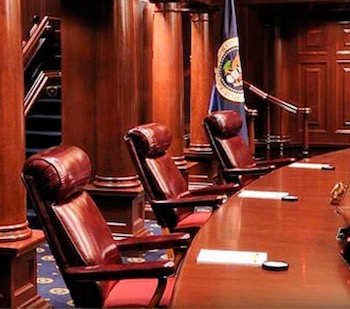 Yesterday the United States Court of Appeals for the Federal Circuit issued an order on a petition for rehearing in Wi-Fi One, LLC v. Broadcom Corporation. Wi-Fi One filed a petition for rehearing and rehearing en banc in three related appeals stemming from inter partes review (IPR) challenges from the Patent Trial and Appeal Board (PTAB) of the United States Patent and Trademark Office (USPTO).
Yesterday the United States Court of Appeals for the Federal Circuit issued an order on a petition for rehearing in Wi-Fi One, LLC v. Broadcom Corporation. Wi-Fi One filed a petition for rehearing and rehearing en banc in three related appeals stemming from inter partes review (IPR) challenges from the Patent Trial and Appeal Board (PTAB) of the United States Patent and Trademark Office (USPTO).
In a Per Curiam Order the Federal Circuit granted the petition for en banc rehearing and vacated the court’s three prior opinions in Wi-Fi One v. Broadcom Corp. The Federal Circuit will consider whether IPR institution decisions are reviewable in light of the Supreme Court’s decision in Cuozzo Speed Technologies v. Lee.
The Federal Circuit requested supplemental briefing limited to the following question:
Should this court overrule Achates Reference Publishing, Inc. v. Apple Inc., 803 F.3d 652 (Fed. Cir. 2015) and hold that judicial review is available for a patent owner to challenge the PTO’s determination that the petitioner satisfied the timeliness requirement of 35 U.S.C. § 315(b) governing the filing of petitions for inter partes review?
The supplemental brief of the Appellant must be filed by Monday, February 13, 2017, with any amicus supporting the Appellant due by Thursday, February 23, 2017. The Appellee’s supplemental brief must be filed by March 15, 2017, with any amicus supporting the Appellee due by Monday, March 27, 2017. Appellant’s reply is due by Wednesday, March 29, 2017. The views of the United States Patent and Trademark Office, as amicus, have been invited by the Federal Circuit. Leave for all other amicus curiae may be filed without consent and leave of court. The oral argument will be scheduled at a later date.
In November 2016, Judges O’Malley and Taranto wrote concurring opinions in a non-precedential case — Click-to-Call Technologies, LP v. Oracle Corp. — questioning whether institution decisions in IPR institution decisions remained unappealable in the wake of the Supreme Court’s decision in Cuozzo. See CAFC Judges invite en banc review.
“I believe the Supreme Court’s language in Cuozzo leaves room for us to question our reasoning in Achates,” wrote Judge O’Malley in Click-to-Call before she recommended that the entire Federal Circuit take the question up en banc. “If the PTO exceeds its statutory authority by instituting an IPR proceeding under circumstances contrary to the language of § 315(b), then our court, sitting in its proper role as an appellate court, should review those determinations as Cuozzo suggests.”
“It appears to me that en banc consideration [of Achates] is warranted,” Judge Taranto wrote in Click-to-Call. “It is notable, to begin with, that the [Supreme] Court pointedly avoided embracing the simplest and most review-barring reading of § 314(d) – namely, that it prohibits judicial review of any determination to institute an IPR.” Taranto would go on to say that he believed that the Supreme Court took “evident pains” to leave open the possibility of review for at least some institution decisions.
Both Judges O’Malley and Taranto voted in Click-to-Call that IPR institution decisions are unreviewable because that is the law of the Circuit. But the en banc review of Wi-Fi One will give the Court the opportunity to review the extent of the unreviewability in light of the Supreme Court’s statements in Cuozzo.
On Tuesday, January 10, 2017, I will host a free webinar discussion on PTAB practice generally and IPRs more specifically. Joining me for the webinar will be former USPTO Director David Kappos and Brad Pedersen, partner with Patterson Thuente Pedersen. Among other things, we will discuss this latest development. CLICK HERE to register.

![[IPWatchdog Logo]](https://ipwatchdog.com/wp-content/themes/IPWatchdog%20-%202023/assets/images/temp/logo-small@2x.png)

![[[Advertisement]]](https://ipwatchdog.com/wp-content/uploads/2023/01/2021-Patent-Practice-on-Demand-1.png)
![[Advertisement]](https://ipwatchdog.com/wp-content/uploads/2024/04/Patent-Litigation-Masters-2024-sidebar-early-bird-ends-Apr-21-last-chance-700x500-1.jpg)

![[Advertisement]](https://ipwatchdog.com/wp-content/uploads/2021/12/WEBINAR-336-x-280-px.png)
![[Advertisement]](https://ipwatchdog.com/wp-content/uploads/2021/12/2021-Patent-Practice-on-Demand-recorded-Feb-2021-336-x-280.jpg)
![[Advertisement]](https://ipwatchdog.com/wp-content/uploads/2021/12/Ad-4-The-Invent-Patent-System™.png)







Join the Discussion
3 comments so far.
Paul F. Morgan
January 6, 2017 03:24 pmFor convenience, here is the subject statutory time bar:
35 U.S.C. § 315(b) states:
An inter partes review may not be instituted if the petition requesting the proceeding is filed more than one year after the date on which the petitioner, real party in interest, or privy of the petitioner is served with a complaint alleging infringement of the patent.
[However, reportedly the Patent Trial and Appeals Board has, on at least three occasions, found that § 315(b)’s one-year deadline does not apply where service of a complaint occurred more than a year ago in an action that was dismissed without prejudice.]
Paul F. Morgan
January 6, 2017 10:37 amI expect a decision that Cuozzo does not require the Fed. Cir. to refuse to consider even a statutory deadline jurisdiction violation in a PTAB IPR institution, as asserted in this case.] [At least if being raised as part of the appeal of a Final IPR decision, as here.]
[But what about mandamus at the time of IPR initiation, which would require reversal of two other Fed. Cir. decisions?]
However,in my view that is NOT the same as the more frequent situation of alleged or fact-disputed charges of a time bar by “privity” between the IPR petitioner and some other corporate entity sued more than a year earlier and thus IPR deadline barred.
[Rather than opening up an IPR delaying deposition discovery “fishing expedition” on that “privity” issue, could not the PTAB simply require written answers to specific PTAB interrogatories to be answered and executed by the IPR petitioner lead counsel?]
Edward Heller
January 5, 2017 04:45 pmGene, Brad was an Achates counsel, and principal author of its briefs.